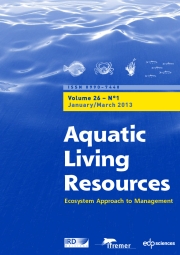Crossref Citations
This article has been cited by the following publications. This list is generated based on data provided by
Crossref.
Burbridge
Hendrick
Roth
and
Rosenthal
2001.
Social and economic policy issues relevant to marine aquaculture.
Journal of Applied Ichthyology,
Vol. 17,
Issue. 4,
p.
194.
Costa‐Pierce, Barry A.
2002.
Ecological Aquaculture.
p.
337.
Chang, Bin
and
Xiong, Liya
2005.
Ecological footprint analysis based on RS and GIS in arid land.
Journal of Geographical Sciences,
Vol. 15,
Issue. 1,
p.
44.
Whitmarsh, David J.
Cook, Elizabeth J.
and
Black, Kenneth D.
2006.
Searching for sustainability in aquaculture: An investigation into the economic prospects for an integrated salmon–mussel production system.
Marine Policy,
Vol. 30,
Issue. 3,
p.
293.
Schianetz, Karin
Kavanagh, Lydia
and
Lockington, David
2007.
Concepts and Tools for Comprehensive Sustainability Assessments for Tourism Destinations: A Comparative Review.
Journal of Sustainable Tourism,
Vol. 15,
Issue. 4,
p.
369.
Boyd, Claude E.
Tucker, Craig
Mcnevin, Aaron
Bostick, Katherine
and
Clay, Jason
2007.
Indicators of Resource Use Efficiency and Environmental Performance in Fish and Crustacean Aquaculture.
Reviews in Fisheries Science,
Vol. 15,
Issue. 4,
p.
327.
Newton, Alice
and
Icely, John
2008.
Land Ocean Interactions in the Coastal Zone, LOICZ: Lessons from Banda Aceh, Atlantis, and Canute.
Estuarine, Coastal and Shelf Science,
Vol. 77,
Issue. 2,
p.
181.
Patterson, Trista M.
Niccolucci, Valentina
and
Marchettini, Nadia
2008.
Adaptive environmental management of tourism in the Province of Siena, Italy using the ecological footprint.
Journal of Environmental Management,
Vol. 86,
Issue. 2,
p.
407.
Zheng, Yan
2008.
The benefit of public transportation: Physical activity to reduce obesity and ecological footprint.
Preventive Medicine,
Vol. 46,
Issue. 1,
p.
4.
Mamouni Limnios, Elena Alexandra
Ghadouani, Anas
Schilizzi, Steven G.M.
and
Mazzarol, Tim
2009.
Giving the consumer the choice: A methodology for Product Ecological Footprint calculation.
Ecological Economics,
Vol. 68,
Issue. 10,
p.
2525.
Rodríguez, Roberto
Garrido, Alberto
and
Llamas, Manuel R.
2009.
La huella hidrológica de la agricultura española.
Ingeniería del agua,
Vol. 16,
Issue. 1,
Fresque, Jennifer
and
Plummer, Ryan
2009.
Accounting for consumption related to outdoor recreation: An application of ecological footprint analysis.
Leisure/Loisir,
Vol. 33,
Issue. 2,
p.
589.
Bosma, Roel H.
and
Verdegem, Marc C.J.
2011.
Sustainable aquaculture in ponds: Principles, practices and limits.
Livestock Science,
Vol. 139,
Issue. 1-2,
p.
58.
Henriques, Justin J.
and
Louis, Garrick E.
2011.
A decision model for selecting sustainable drinking water supply and greywater reuse systems for developing communities with a case study in Cimahi, Indonesia.
Journal of Environmental Management,
Vol. 92,
Issue. 1,
p.
214.
Samuel-Fitwi, Biniam
Wuertz, Sven
Schroeder, Jan P.
and
Schulz, Carsten
2012.
Sustainability assessment tools to support aquaculture development.
Journal of Cleaner Production,
Vol. 32,
Issue. ,
p.
183.
Parker, Robert W.R.
and
Tyedmers, Peter H.
2012.
Uncertainty and natural variability in the ecological footprint of fisheries: A case study of reduction fisheries for meal and oil.
Ecological Indicators,
Vol. 16,
Issue. ,
p.
76.
Lopes, Carla
Antelo, Luis T.
Franco-Uría, Amaya
Botana, Carlos
and
Alonso, Antonio A.
2013.
Sustainability of port activities within the framework of the fisheries sector: Port of Vigo (NW Spain).
Ecological Indicators,
Vol. 30,
Issue. ,
p.
45.
Kharrazi, Ali
Kraines, Steven
Hoang, Lan
and
Yarime, Masaru
2014.
Advancing quantification methods of sustainability: A critical examination emergy, exergy, ecological footprint, and ecological information-based approaches.
Ecological Indicators,
Vol. 37,
Issue. ,
p.
81.
Lopes, Carla
Antelo, Luis T.
Franco-Uría, Amaya
Alonso, Antonio A.
and
Pérez-Martín, Ricardo
2015.
Valorisation of fish by-products against waste management treatments – Comparison of environmental impacts.
Waste Management,
Vol. 46,
Issue. ,
p.
103.
Oita, Azusa
Nagano, Ichiro
and
Matsuda, Hiroyuki
2016.
An improved methodology for calculating the nitrogen footprint of seafood.
Ecological Indicators,
Vol. 60,
Issue. ,
p.
1091.


